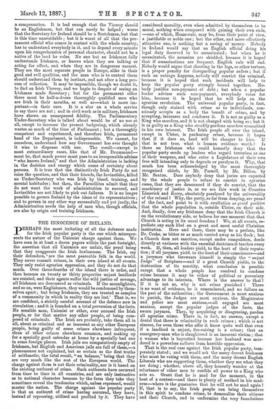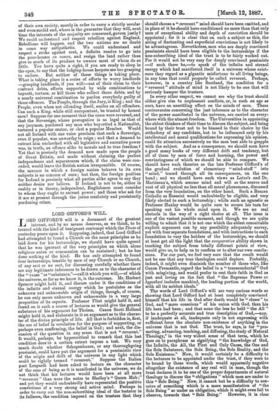THE INNOCENCE OF IRELAND.
PERHAPS the most irritating of all the defences made for the Irish popular party is the one which misrepre- sents the nature of the Unionist charge against them. We have seen in at least a dozen papers within the past fortnight, the assertion that all Unionists are unfair, the proof being that they exaggerate the Irish lawlessness. The Irish, say their defenders, are the most peaceable folk in the world. They never commit crimes, in their own island at all events. They only resist agrarian oppression, and they do not do that much. Over three-fourths of the island there is order, and then because on twenty or thirty properties unjust landlords are resisted, and their agents suffer the wild justice of revenge, all Irishmen are denounced as criminals. If the moonlighters, and so on, were Englishmen, they would be condemned by them- selves apart ; but being Irishmen, they are treated as samples of a community in which in reality they are lost.' That is, we are confident, a strictly careful account of the defence now in circulation ; and it is founded on a total perversion of the facts. No sensible man, Unionist or other, ever accused the Irish people, or for that matter any other people, of being com- posed of criminals. The Irish are probably, take them all in all, about as criminal and as innocent as any other European people, being guilty of some crimes elsewhere infrequent, clean of other crimes elsewhere common, and making up for a specially good calendar at home by a specially had one in some foreign places. Irish jails are comparatively empty of Irishmen, but English and American jails are fall of them,—a phenomenon not explained, but as certain as the first truths of arithmetic, the total result, "on balance," being that they are very much like the rest of the European world. The charge against them is not their criminality, nor is it based on the existing outburst of crime. Such outbursts have occurred from time to time in all countries, and are only instructive as to national character because by the form they take they sometimes reveal the tendencies which, unless repressed, would master the nation. The charge against the popular party is that an outburst of crime having occurred, they have, instead of repressing, utilised and profited by it. They have considered morality, even when admitted by themselves to be moral, nothing when compared with gaining their own ends, —one of which, Home-rule, may be, from their point of view, a justifiable or noble one ; but the other, and more effectively attractive one, is nothing but a saving of money. Nobody in Ireland would say that an English official doing his legal duty deserved to be assassinated ; but when he is assassinated, the assassins are shielded, because it is hoped that if assassinations are frequent, English rule will end. Nobody would argue that shooting in the legs, or other torture, is a proper penalty for disregarding popular orders ; but if such an outrage happens, nobody will convict the criminal, because it is hoped that such incidents will help to keep the popular party strongly bound together. No- body justifies non-payment of debt ; but when a popular leader advises such non-payment, everybody votes for him, because it is hoped that he will help on the agrarian revolution. The universal popular party, in fact, though only stained with crime as to individuals, con- sciously accepts as a body the benefit of crime, and by accepting, increases and condones it. It is not as guilty as a King who murders, and it is not charged with being so ; but it is as guilty as a King who steadily pardons murders committed in his own interest. The Irish people all over the island, except in Ulster, is pardoning crime, because it hopes that if it does so, land will be cheaper to hire. If that is not true, what is human evidence worth? Is there an Irishman who could honestly deny that the popular party sends up leaders who regard terrorism as one of their weapons, and who enter a Legislature of their own free will intending only to degrade or paralyse it. Why, that much has been acknowledged by the most thoroughly recognised chiefs, by Mr. Parnell, by Mr. Dillon, by Mr. Sexton. Does anybody deny that juries are expected by the whole people to refuse to convict in agrarian cases, that they are denounced if they do convict, that the machinery of justice is, as we see this week in Counties Limerick and Kerry, absolutely paralysed by the universality of the refusal ? Why, the party, so far from denying, are proud of the fact, and point to it with exultation as proof positive that the whole population is, outside Ulster, on their side. And, finally, does any Irishman deny that the Irish Church is on the revolutionary side, or believe for one moment that that Church is acting in its usual freedom ? We, at all events, re- pudiate any such libel on a great and most useful Christian institution. Here and there, there may be a prelate, like Dr. Croke, as bitter or as much carried away as his flock ; but a Church does not sanction, except under compulsion, deeds directly at variance with the essential doctrines it teaches every week. If, then, all leaders yield, to the hurt of their reputa- tion; if all jurymen yield. to the hurt of their consciences—and a juryman who forswears himself is simply the "unjust Judge" of Scripture—and if a great Church yields, to the destruction of its sanctity, what conclusion is possible except that a whole people has resolved to condone crime because it may be either of political or pecuniary advantage to its interests. Where is the answer to that? If it is not so, why is not crime punished ? There is no want of evidence, be it remembered, and no failure on the part of the authorities ; the Government is most anxious to punish, the Judges are most anxious, the Magistrates and police are most anxious,—all engaged are most anxious, except the popular judges of the facts, the sworn jurymen. They, by acquitting or disagreeing, pardon all agrarian crime. There is, in fact, no answer, except a denial that there is criminality in such crimes ; which is not sincere, for even those who offer it know quite well that even if a landlord is unjust, fire-raising is a crime ; that an emergency-man who is slaughtered is an innocent victim ; that a woman who is boycotted because her husband was mur- dered is a powerless sufferer from horrible oppression.
That is the real case against the Irish popular party, tem- perately stated ; and we would ask the many decent Irishmen who must be voting with them, and the many decent English Liberals who are supporting them, whether they see what they are doing ; whether, above all, they honestly wonder at the reluctance of other men to confide all power to a King who acts so. Grant that he is mad for the moment, in the heat of a contest—and there is plenty of method in his mad- ness—where is the guarantee that he will not be mad again? If, that is to say, the Irish people can bring themselves in this spirit to condone crime, to demoralise their citizens and their Church, and to undermine the very foundations
of their own society, merely in order to carry a strictly secular and even sordid end, where is the guarantee that they will, next time the interests of the majority are concerned, govern justly? We could understand and respect rebellion against England. Rebellions will happen, and the two nations are no doubt in some way antipathetic. We could understand and respect a strike against rent, a definite resolve to go into the poor-houses en masse, and resign the land rather than give so much of its produce to owners most of whom do so little. You have quite a right, if you are ready to sleep in the open, to say that the lodging-house keepers are too grasping to endure. But neither of these things is taking place. What is taking place is a series of efforts to worry landlords —grasping landlords, if you will—out of their claim to their contract debts, efforts supported by wide combinations to boycott, torture, or kill those who collect those debts, and by a nearly universal combination to pardon everybody guilty of those offences. The People, through the Jury, is King ; and the People, even when not offending itself, smiles on all offenders. Can such a King, while still unrepentant, be trusted by honest men? Suppose for one moment that the cases were reversed, and that the Sovereign, whose prerogative is as legal as that of any juryman, pardoned any man who boycotted a Nationalist, tortured a popular orator, or shot a popular Member. Would not all Ireland with one voice proclaim that such a Sovereign, even if popular, was unworthy to reign ; and that a demand to entrust him unchecked with all legislative and executive power was, in truth, an offence alike to morals and to true freedom Yet that is precisely the demand now made upon the people of Great Britain, and made without claiming the perfect independence and separateness which, if the claim were con- ceded, would leave the British nation irresponsible. Of course, the manner in which a foreign nation behaves to its own subjects is no concern of ours ; but then, the foreign position for Ireland is precisely what all parties alike agree to say they neither desire nor believe. If Ireland is not to be, either in reality or in theory, independent, Englishmen must consider to whom they ought to entrust power; and those who ask for it are at present through the juries resolutely and persistently pardoning crime.



































 Previous page
Previous page